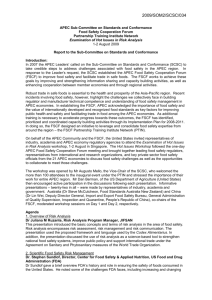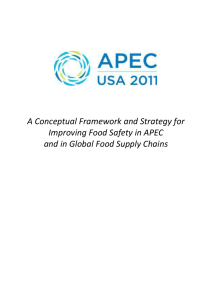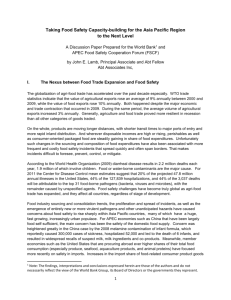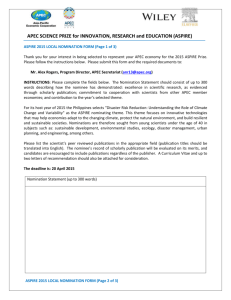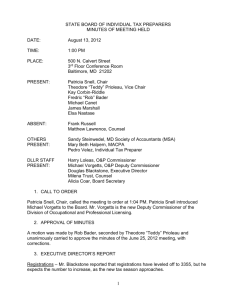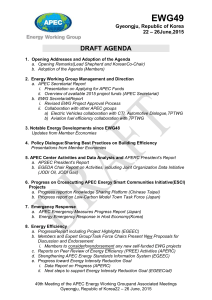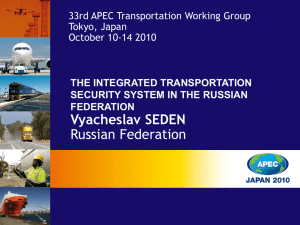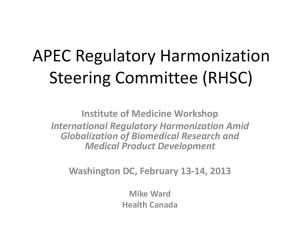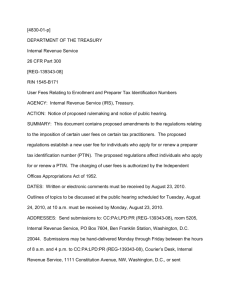APEC FOOD SAFETY LABORATORY CAPACITY BUILDING 2011
advertisement
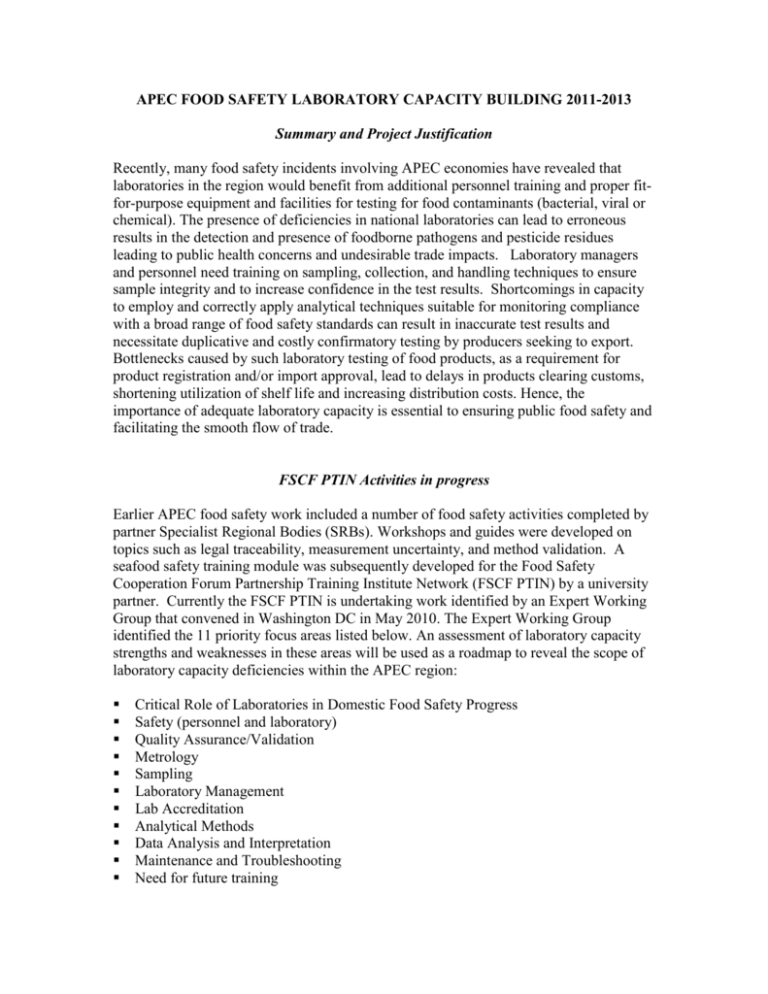
APEC FOOD SAFETY LABORATORY CAPACITY BUILDING 2011-2013 Summary and Project Justification Recently, many food safety incidents involving APEC economies have revealed that laboratories in the region would benefit from additional personnel training and proper fitfor-purpose equipment and facilities for testing for food contaminants (bacterial, viral or chemical). The presence of deficiencies in national laboratories can lead to erroneous results in the detection and presence of foodborne pathogens and pesticide residues leading to public health concerns and undesirable trade impacts. Laboratory managers and personnel need training on sampling, collection, and handling techniques to ensure sample integrity and to increase confidence in the test results. Shortcomings in capacity to employ and correctly apply analytical techniques suitable for monitoring compliance with a broad range of food safety standards can result in inaccurate test results and necessitate duplicative and costly confirmatory testing by producers seeking to export. Bottlenecks caused by such laboratory testing of food products, as a requirement for product registration and/or import approval, lead to delays in products clearing customs, shortening utilization of shelf life and increasing distribution costs. Hence, the importance of adequate laboratory capacity is essential to ensuring public food safety and facilitating the smooth flow of trade. FSCF PTIN Activities in progress Earlier APEC food safety work included a number of food safety activities completed by partner Specialist Regional Bodies (SRBs). Workshops and guides were developed on topics such as legal traceability, measurement uncertainty, and method validation. A seafood safety training module was subsequently developed for the Food Safety Cooperation Forum Partnership Training Institute Network (FSCF PTIN) by a university partner. Currently the FSCF PTIN is undertaking work identified by an Expert Working Group that convened in Washington DC in May 2010. The Expert Working Group identified the 11 priority focus areas listed below. An assessment of laboratory capacity strengths and weaknesses in these areas will be used as a roadmap to reveal the scope of laboratory capacity deficiencies within the APEC region: Critical Role of Laboratories in Domestic Food Safety Progress Safety (personnel and laboratory) Quality Assurance/Validation Metrology Sampling Laboratory Management Lab Accreditation Analytical Methods Data Analysis and Interpretation Maintenance and Troubleshooting Need for future training In May 2011 the FSCF PTIN began the process to perform a food safety laboratory capacity (FSLC) needs assessment for the APEC region. A targeted comprehensive FSLC assessment of APEC economies will identify gaps in the FSLC needs of the emerging APEC market economies. The assessment will incorporate information obtained from other surveys, assessments, and research previously performed by various academic institutions, government agencies, SRBs, and international organizations. The FSLC survey instrument will be administered between May and August 2011. Following the conclusion of the assessment a regional laboratory capacity building workshop will be held in September 2011 to assess the findings and identify how the FSCF PTIN can add value to address the priority areas. The assessment of survey results and final analysis will be presented at the workshop as a baseline document of APEC laboratory needs and capabilities, which will be used to further inform the 2-3 year capacity building work plan. As noted at the May 2010 expert working group, it is important that laboratory personnel, as well as policymakers, understand the role of laboratory activities in the food safety system, how the activities carried out by laboratories fit into the overall picture of risk management, regulatory framework, public health, and the global economic market. Raising awareness of the importance of strong laboratory systems for improving both local and global food safety, as well as the importance of sharing data between laboratories is essential to building support for laboratory activities within APEC economies. In this light, the FSCF PTIN will develop a paper that will serve as a template for a curriculum on the Global Context of Food Safety. This document will focus on the importance of quality systems (including relevant accreditation) and efficacy of analyses for building universal acceptance internationally, and highlight how food safety further affects global food security, as well as its trade and economic impacts. The final version of this paper could be presented at the September workshop. Envisioning a Work Plan: 2011-2013 Subsequent to the September 2011 workshop, where the FCSF PTIN identifies it can add value, it will begin to assist countries to develop individual work plans to fill gaps in capacity as revealed by the baseline document. Evaluation of capacity building activities should be an integral part of each work plan. There are several ways that the FSCF PTIN envisions addressing these needs: Country and Regional Workshops Information contained in the APEC FSLC baseline document will allow individual countries, regions or entities such as the SRBs or industry to identify potential training partnerships based on common desired outcomes. For instance, an APEC economy or region may have been targeted for lab capacity building at some point in the past and find themselves in possession of new or upgraded equipment, but without the properly trained personnel to be able to utilize the equipment. Several laboratories within a region may want to prepare for proficiency testing at the same time. Another economy or group of economies may have been experiencing ongoing safety concerns that are not easily anticipated and are systemic in nature. Or there may be a lack of training in proper sampling methodology across an entire spectrum of adulterants. In each of these cases a bilateral or multilateral learning partnership could potentially reference the APEC FSLC baseline document in developing a proposal to access funding for a country or regional training workshop addressing these targeted needs. FSCF PTIN has a number of active SRB partners and envisions these entities taking an active role in developing metrology training as well as preparing for the next steps of proficiency testing and accreditation. The FSCF PTIN envisions all of these training opportunities will function as precursors to eventual proficiency testing and accreditation, thereby strengthening the links of the APEC regulatory infrastructure. Regional train-the-trainer programs For some sectors, economies or regions, a more fully immersive and comprehensive train-the-trainer laboratory training program may be the most appropriate starting point. This type of training will typically require more assistance from regional experts such as SRBs and regional training facilities. To be cost effective within the constraints of typically shrinking budgets, the training must focus on being transmittable, that is, it should produce not only a well-educated student, but a trainer as well. This will ensure sustainability of the training. There are several possibilities that the FSCF PTIN could take for this more intensive immersive level of training. Several economies have expressed an interest in developing regional brick and mortar training centers. In the United States, one FSCF PTIN university partner is in the latter stages of construction on a food safety laboratory training facility and has developed training curricula to be used both onsite and offsite. Up to 20 individuals would be able to train in groups in a well-equipped, fit-for-purpose, hands-on classroom laboratory. Knowledge and skills acquired in this environment and possible future analogues would be taken back to the trainees’ home laboratories. This knowledge is not only expected to be transmittable to other laboratory staff, but is expected to be used to help evaluate the sufficiency of the facilities, equipment and continuing training schedule of the home laboratory for accomplishing the laboratory’s stated purpose. Follow-up training Industry groups are in a unique position to understand the connections between food safety and global markets. Trainers who have participated in a workshop, regional trainthe-trainer or other program could benefit significantly from an on-site follow-up visit from either an FSCF PTIN industry partner or NGO partner versed in food safety. If conducted several months after a training event, these follow-ups would provide an opportunity for trainers and other staff to gain clarification on questions and address concerns that may become evident only after returning to a home laboratory. Making FSCF PTIN training modules freely available Topics that lend themselves to a traditional classroom learning environment are excellent candidates for training modules. Some of the priority focus areas may be suitably addressed at a basic level or beyond using training models. For instance, basic laboratory safety is often taught in universities through videos followed by a certifying examination. Aspects of quality assurance (QA), basic metrology, sampling theory, laboratory management, analytical methods, and data analysis and interpretation can be introduced through training modules that may offer a complete treatment of a topic, or provide a foundation for further hands-on learning. These modules may be obtained readymade from FSCF PTIN partners or may be developed using FSCF PTIN secured funding to address a specific priority focus topic. The seafood safety training module that was recently developed for the FSCF PTIN provides a model for future modules to build on. The FSCF PTIN also seeks to develop reproducible curricula on the Global Concept of Food Safety which will be easily replicable and accessible from the FSCF PTIN website. Future training modules will be made freely available via the FSCF PTIN website when appropriate and as available.

